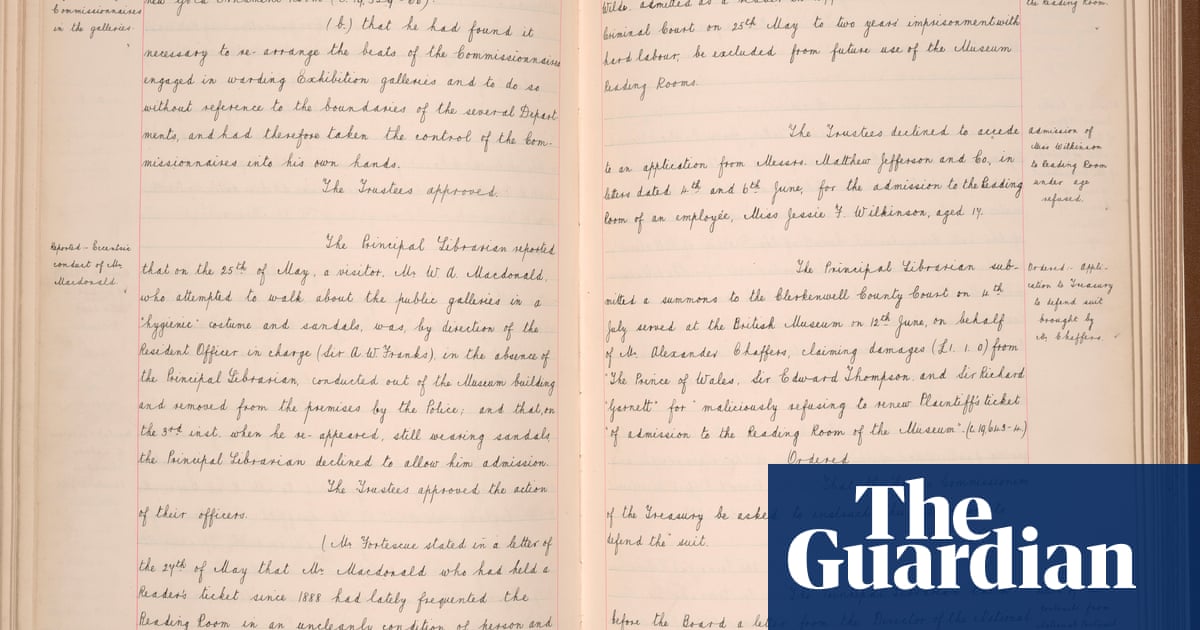TheBritish Libraryis to symbolically reinstate Oscar Wilde’s reader pass, 130 years after its trustees cancelled it following his conviction for gross indecency.
A contemporary pass bearing the name of the Irish author and playwright will be officially presented to his grandson, Merlin Holland, at an event in October, it will be announced on Sunday.
Rupert Everett, who wrote, directed and starred as Wilde in The Happy Prince – the acclaimed 2018 film about the writer’s tragic final years in exile – will play a part in the ceremony.
Holland is an expert on Wilde whose publications include The Complete Letters ofOscar Wilde. Asked how his grandfather might have reacted to the pass being reinstated, he said: “He’d probably say ‘about time too’.”
The decision to revoke the pass is recorded in board minutes in 1895, when homosexuality was illegal: “The Trustees directed that Mr Oscar Wilde, admitted as a reader in 1879 and sentenced at the Central Criminal Court on 25th May to two years’ imprisonment with hard labour, be excluded from future use of the Museum’s Reading Room.”
Wilde’s downfall followed his decision to sue Lord Queensberry, who had accused him of being a “sodomite” after discovering that his son, Lord Alfred “Bosie” Douglas, was Wilde’s lover. It led to Wilde being sentenced to two years of hard labour.
Having been the toast of London society, Wilde died in abject poverty in Paris in 1900, aged 46. After his disgrace and imprisonment, his wife, Constance, fled to Europe with their two sons, Cyril and Vyvyan, and changed their surname to Holland, an ancestral family name.
Holland said: “Oscar had been in Pentonville prison for three weeks when his [pass] to theBritish MuseumReading Room [now the British Library] was cancelled, so he wouldn’t have known about it, which was probably as well … It would have just added to his misery to feel that one of the world’s great libraries had banned him from books just as the law had banned him from daily life. But the restitution of his ticket is a lovely gesture of forgiveness and I’m sure his spirit will be touched.”
In 2017, Wilde was assumed to be among more than 50,000 gay and bisexual men who were posthumously pardoned, although the Ministry of Justice said no individuals would be named.
Holland said: “Oscar didn’t think there was anything wrong in same-sex love … I’m not absolutely certain he has been pardoned … If I had to ask for a pardon, I wouldn’t, because all it would do is make the British establishment feel better about itself … History’s history, and you can’t start rewriting it.”
The British Library boasts arguably the world’s most significant collection of Wilde manuscripts, including drafts of his major plays, Lady Windermere’s Fan, A Woman of No Importance, An Ideal Husband and The Importance of Being Earnest.
Laura Walker, the British Library’s lead curator of modern archives and manuscripts, said this extraordinary collection makes Wilde’s pass all the more meaningful: “We really want to honour Wilde now and acknowledge what happened to him. Section 11 of the law, which related to the criminalisation of homosexuality, was unjust.”
Sign up toBookmarks
Discover new books and learn more about your favourite authors with our expert reviews, interviews and news stories. Literary delights delivered direct to you
after newsletter promotion
In 1973, the British Library officially separated from the British Museum, although it continued to be housed in the Reading Room until 1997, when the new British Library building opened in St Pancras.
Wilde’s long relationship with the British Museum started while he was still a student and, after moving to London in 1879, he applied for a reader pass. But he was not afraid to criticise the institution. When he published his long poem The Sphinx, he was asked why he had printed only a few copies. He replied: “My first idea was to print only three copies: one for myself, one for the British Museum, and one for Heaven. I had some doubt about the British Museum.”
Holland joked that Wilde was “setting heaven and himself above the British Museum in a teasingly arrogant way” – a “slightly naughty throwaway remark about a very august institute, exactly the sort of thing that he would have regarded as being slightly stuffy and conventional”.
He added: “He probably would [be] obliged now to make an apology … on … his rude remark … once they’d given him his pass back.”
The British Library event – on 16 October, Wilde’s birthday – will include a public talk by Everett and Holland, launching the latter’s new book,After Oscar: The Legacy of a Scandal, an account of Wilde’s posthumous life.
